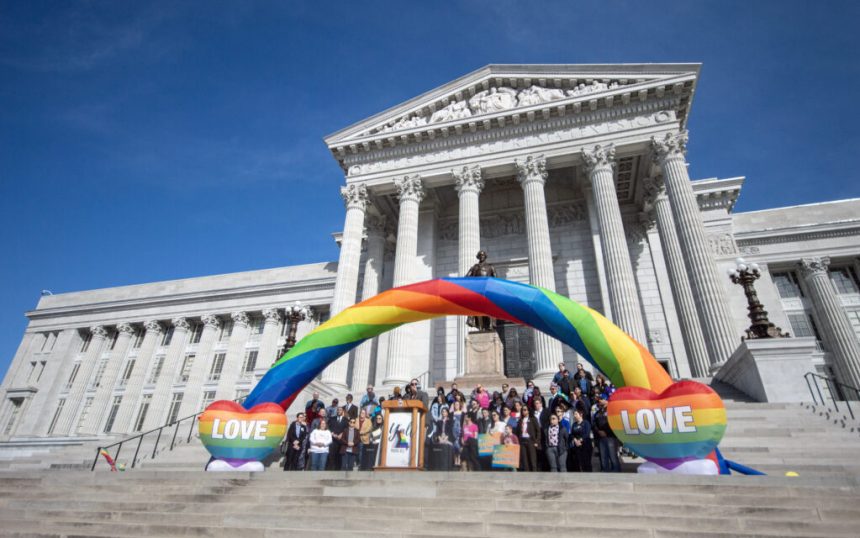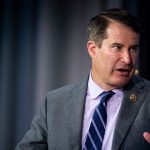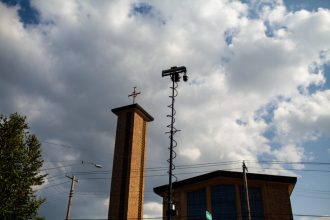Casey Pick, Director of Law and Policy at The Trevor Project, speaks at a rally on the steps of the Missouri Capitol Feb. 21, 2023. That day, Missouri lawmakers held two hearings on anti-LGBTQ+ bills (Annelise Hanshaw/Missouri Independent).
When Missourians vote next year on whether to outlaw most abortions, they will also decide whether the state constitution should include a ban on gender-affirming care for minors.
Such a move — placing prohibitions on certain procedures for transgender children in the state’s constitution — would be unprecedented in the United States and likely impossible to reverse.
The debate is playing out while a lawsuit challenges the constitutionality of the state’s current ban, along with an ongoing investigation by the state attorney general into medical clinics offering gender-affirming care.
Missourians’ access to puberty blockers and cross-sex hormones wasn’t always so fraught.
Gender-affirming care bans were not proposed in Missouri until 2020, when two state representatives filed bills seeking to bar those under 18 from accessing medical and surgical transitions.
The full House and Senate didn’t even debate the idea until 2023 — and only after national attention came crashing down on a St. Louis clinic.
At the start of that year, Missouri Attorney General Andrew Bailey, who has since left office to become co-deputy director of the FBI, launched an investigation into pediatric gender-affirming care. At the root of the probe was an affidavit from Jamie Reed, a former social worker at the Washington University Transgender Center who alleged the center was rushing children into puberty blockers and cross-sex hormones without mental health care.
Two days after signing the affidavit, Reed’s story became national news when it was published by The Free Press, a website founded by Bari Weiss, who was recently named editor-in-chief of CBS News.
The story went off like a bomb in Missouri politics, and within a week a state Senate committee was discussing it as justification to ban access to certain procedures for transgender minors. That ban quickly was passed into law, along with a ban on transgender athletes competing according to their gender identity, and signed by then-Gov. Mike Parson.
Patients who received care at the Transgender Center are still fighting the claims made in Reed’s 2023 article. And the clinic, which saw over a thousand patients over the course of five years, stopped providing medical care to minors because of the fallout caused by Reed’s story.
The attorney general’s investigation, which includes inquiries into other gender-affirming care providers, is ongoing even as Bailey was replaced last month by Republican Catherine Hanaway.
Prior to becoming attorney general, Hanaway served on the Washington University Board of Trustees. Upon taking office, she stepped down from the board and recused herself from the office’s investigation, her spokesperson told The Independent.
Solicitor General Lou Capozzi, who is leading the investigation alongside Deputy Attorney General Jeremiah Morgan, said in a statement that he is “committed to continuing our investigation into the center.”
“Although we are grateful the Washington University Transgender Center has shut down and is no longer performing gender transition services on minors,” he said, “there must be accountability for past actions.”
The Transgender Center has not completely shuttered but specifies on its webpage that it only treats those 18 and older. The scope of the attorney general’s investigation is unclear, with three active lawsuits determining the amount of information that physicians are obligated to turn over.









